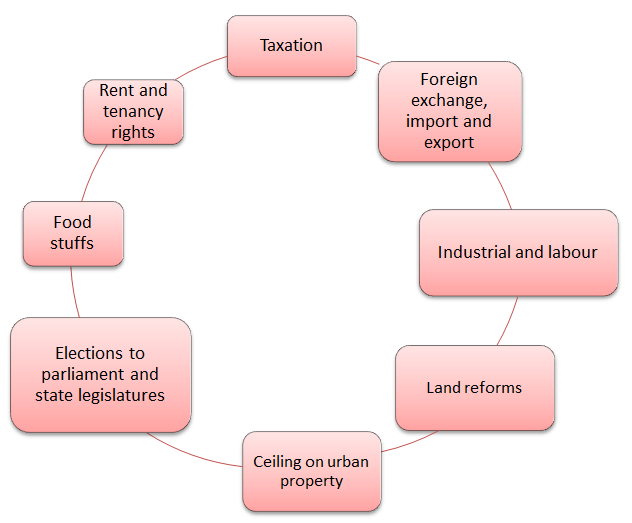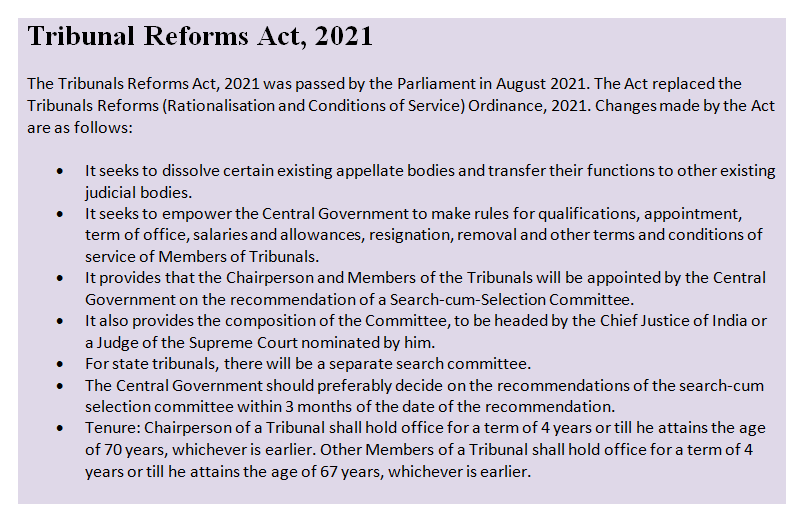Tribunals
Tribunals are quasi-judicial institutions for speedy and specialised dispensation of justice. after 42nd constitutional amendment which incorporated articles 323A and 323B, the number of tribunals has burgeoned both at centre and state level. further increasing complexities in laws, pendency in the mainstream judiciary, need for subject experts in deciding cases etc. have also led to an increased number of tribunals. This trend is being called as tribunalization of justice.
Originally the constitution did not contain provisions with respect to tribunals. A new part XIV-A was added to the Constitution by the 42nd amendment act of 1976. this part is entitled as tribunals and consists of only two articles:

Administrative Tribunals
The characteristics of administrative tribunals are mentioned below.
- They are of statutory origin, and so must be created by a statute by Parliament/Legislatures.
- They are quasi-judicial in nature, which means, they have some, not all the features of a court.
- They function on the principles of natural justice and are not bound by the Civil Procedure Code.
- They have the power to summon witnesses, administer oaths and compel the submission of documents, etc. like other courts.
- The writs of prohibition and certiorari are available against decisions of such tribunals.
- They are independent bodies and are not subject to administrative interference.
The provisions of Article 323A given in the Constitution are:
(1) Parliament may, by law, provide for the education or trial by administrative tribunals of disputes and complaints with respect to recruitment and conditions of service of persons appointed to public services and costs in connexion with the affairs of the union or of any state or of any local or other authority within territory of India or under the control of the Government of India or of any corporation owned or controlled by the government.
(2) A law made under clause one may-
- Provide for the establishment of an administrative tribunal for the union and a separate administrative tribunal for each state offer two or more states;
- specify the jurisdiction, powers (Including the power to punish for contempt) And authority which may be exercised by each of the set tribunals;
- Provide for the procedure (including provisions as to limitation and rules of evidence) to be followed by the set tribunals;
- exclude the jurisdiction of all courts, except the jurisdiction of the Supreme Court under article 136, with respect to the disputes or complaints referred to in clause (1);
- Provide for the transfer to each such administrative tribunal of any cases pending before any quote or other authority immediately before the establishment of such tribunal as would have been within the jurisdiction of such tribunal if the cause of action on which such suits or proceedings are based had arising after such establishment;
- Repeal or amend any order made by the president under clause (3) of article 371D;
- Contain such supplemental, incidental and consequential provisions (including provisions as to fees) as parliament may deem necessary for the effective functioning of, And for the speedy disposal of cases by, and the enforcement of the orders of, such tribunals.
(3) the provisions of this article shall have effect notwithstanding anything in any other provision of this constitution or in any other law for the time being in force.
In pursuance of this article, parliament has passed the administrative tribunals act in 1985. the act authorises the central government to establish one central administrative tribunal and the state administrative tribunals. this act opened in new chapter in the sphere of providing speedy and inexpensive justice to the aggrieved public servants.
| Central Administrative Tribunal | State Administrative Tribunal | |
| Establishment | Central Government is authorized under Administrative Tribunal Act, 1985 to establish a CAT. | Central government is authorized under Administrative Tribunal Act, 1985 to establish a SAT on specific request of the concerned state government. |
| Jurisdiction | All India services, central civil services, civil posts (Centre), civilian employees of Defense services.
|
Recruitment and all service matters of state government employees. |
| Appointment of members of the tribunals | By Central Government on the recommendation of a Search-cum-Selection Committee. | A separate search committee will be there for state tribunals. |
| Composition of search-cum-selection committee | The Chief Justice of India, or a Supreme Court Judge nominated by him, as the Chairperson (with casting vote),
2 Secretaries nominated by the central government, The sitting or outgoing Chairperson or a retired Supreme Court Judge, or a retired Chief Justice of a High Court, The Secretary of the Ministry under which the Tribunal is constituted (with no voting right).
|
The Chief Justice of the High Court of the concerned state, as the Chairman (with a casting vote),
The Chief Secretary of the state government and the Chairman of the Public Service Commission of the concerned state, The sitting or outgoing Chairperson, or a retired High Court Judge, The Secretary or Principal Secretary of the state’s general administrative department (with no voting right).
|
| Composition of the administrative tribunal | 1 chairman
65 members – drawn from judicial and administrative streams – appointed by President.
|
|
| Qualification of members |
To be decided by the Central Government |
|
| Term of office |
Chairman – 4 years or until he/she attains the age of 70 years. Members – 4 years of until they attain the age of 67 years. |
|
Tribunal for other matters
(1) The appropriate legislature may, by law, provide for the adjudication or trial by tribunals of any disputes, Complaints, or offences with respect to all or any of the matters specified in clause (2) with respect to which such legislature has power to make laws.
(2) The matters referred to in clause one are the following:

(3) A law made under clause (1) may-
- Provide for the establishment of a hierarchy of tribunals;
- specify the restriction, powers and authority which may be exercised by each of these said tribunals.
- Provide for the procedure to be followed by the said tribunals;
- exclude the jurisdiction of all courts except the jurisdiction of the Supreme Court under article 136, with respect to all or any of the matters falling within the jurisdiction of the said tribunals;
- provide for the transfer to each such tribunal of any cases pending before any quote or any other authority immediately before the establishment of such diagonal as would have been within the jurisdiction of such tribunal if the causes of action or which such suits or proceedings are based had arisen after such establishment;
- insert supplemental incidental and consequential provisions as the appropriate legislature may deem necessary for the effective functioning of, and for the speedy disposal of cases by, and the enforcement of the orders of, such tribunals.
(4) The provisions of this article shall have effect notwithstanding anything in any other provision of this constitution or in any other law for the time being in force.
Difference between Article 323A and Article 323B:

Tribunal vs Court
Both tribunals and courts deal with settling disputes between parties that affect the subjects’ rights. Tribunals are like courts in many respects but there are differences between the two. The following table summarises the difference between tribunals and courts.

Challenges
- Separation of Powers: tribunalization is seen as encroachment in judiciary by the government
- Devalue the authority of HCs: The appeals from tribunal ho directly to the SC, bypassing High Courts. In this case, SC would have less time and resouces for constitutional matters.
- Rampant Tribunalization: It has also been seen that various tribunals have been established in regular course without considering need or making any due analysis.
- Costly: Tribunals lead to justice becoming costly and less accessible as unlike HCs, tribunals are not present in all states.
- High backlog of cases: As per the report of the law panel, the top five central tribunals in the country have a combined backlog of over 3.50 lakh cases.



![Prayas-लक्ष्य [UPSC CSE Target] The Prayas India](https://theprayasindia.com/wp-content/uploads/2021/08/Prayas-लक्ष्य-UPSC-CSE-Target-The-Prayas-India-300x167.png)

![Prayas Pre-भेदश [UPSC CSE Prelims Test Series] The Prayas India](https://theprayasindia.com/wp-content/uploads/2021/08/Prayas-Pre-भेदश-UPSC-CSE-Prelims-Test-Series-The-Prayas-India-300x167.png)










